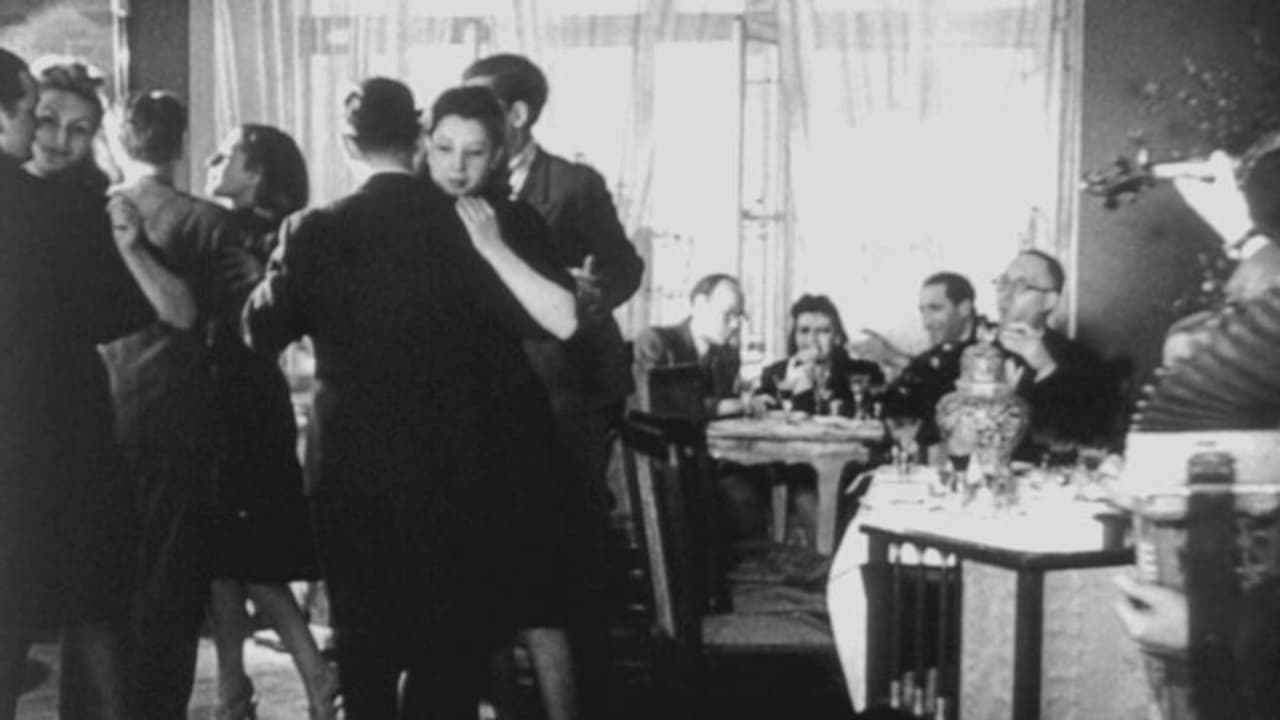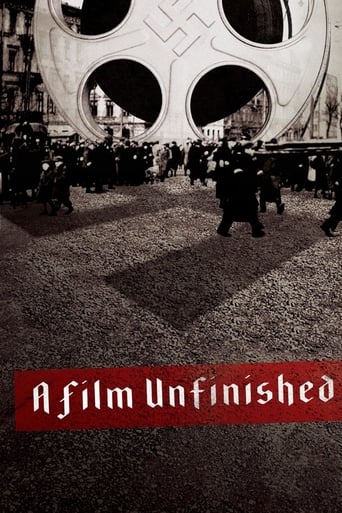Ameriatch
One of the best films i have seen
Myron Clemons
A film of deceptively outspoken contemporary relevance, this is cinema at its most alert, alarming and alive.
Michelle Ridley
The movie is wonderful and true, an act of love in all its contradictions and complexity
Lela
The tone of this movie is interesting -- the stakes are both dramatic and high, but it's balanced with a lot of fun, tongue and cheek dialogue.
classicsoncall
A single film cannister simply labeled 'The Ghetto', found many years following the end of World War II, sheds light on the Nazi propaganda machine and it's attempt to manipulate public opinion by revealing how 'wealthy' Jews seemingly lived alongside those of lesser means without regard for their squalid conditions. I was fascinated by the frequent use of the term 'rich' Jews, as today, the clothes they wore and the parties they attended under staged conditions resembled what would be considered moderately middle class. In actuality, I couldn't relate to terms like 'luxury' and 'paradise' as portrayed in the documentary, although one might consider that luxury would have described any possibility of escaping the torment and misery depicted here.If one's only perception of living conditions for the mass of Jewish humanity under the Nazi regime is pictures like "Schindler's List", then this footage offers the real deal. It's impossible to imagine hundreds of thousands of people cramped into a three square mile area of a ravaged city, starving and malnourished, tossing garbage out the windows of their tenements because they're too weak to dispose of it properly. Gaunt, expressionless children rummaging through piles of garbage looking for a useful bit of food scrap. The dead brought out to sidewalks and left to be rounded up in mass graves because they couldn't be buried properly. The conditions presented in this film are almost impossible to conceive in one's imagination, so horrid are the images that citizens of the Warsaw Ghetto had to endure as part of their daily life.Much of the film commentary is gleaned from the written documentation provided by Adam Czerniakow, the head of the Jewish council placed in charge of the Ghetto by the Nazi regime. There's also the recollections of cameraman Willy Wist who recorded much of the atrocity, one of the few such photographers who's name can be connected to the visual history of this era. By the end of his tenure, Czerniakow obviously concluded that his job in The Ghetto was that of a manager of a holding pen for Jewish natives and refugees on their way to a Nazi final solution, the Treblinka Death Camp. Two months after being ordered to draw up lists of Jews for relocation to Treblinka, he committed suicide with a cyanide capsule.As a historical document, this film is unscathing in it's portrayal of Nazi atrocity and the dehumanization of life on a grand scale. The reactions of now elderly survivors of the era who witnessed the conditions portrayed when they were children lends further testimony to how fortunate they were to finally escape. For historians and anyone interested in World War II, this is an unflinching look at how Man's inhumanity to Man can achieve indescribable proportions.
mirekcanada
This film is testament to the survivors of the "Final Solution" but its also a sad reminder of my past, as a relative of a survivor its just almost as bad as living it yourself I heard the stories from my Dad and Grandmother, and they sounded like unbelievable stories, But to see the footage I was able to put a real face on the stories my Relatives told me, I could picture my Dad as one of the children in the documentary ( hes was yrs old in 1942) My grandfather was a prisoner of Auswich, my grandmother worked at one of the factories associated with the concentration camp, she refused to leave Poland as the transfered the workers to Germany when the Russians where at the footsteps, subsequently when the Russians arrived at the new Factory in Germany the shot all the Poles who worked their as collaborators so thanks to My grandma I'm here today. Seeing this documentary reminds me of the life they had, what they endured, and the reason I,m here today . I thank the people who put this together and most of all I thank my Grandmother, Grandfather (he escaped and was part of the Polish Army at Monty Casino) and my father who had no childhood. I love you all and God bless.So see it to mourn for the dead and to celebrate the privileged live you live, and thank the WWII veterans who gave their lives, and the many who returned scared for life to rid us of the Nazis
jparsons-106-257792
When you watch this film, you will be told multiple times that the purpose of the film is unknown. Yet, when you listen to the description of how the film was made, and consider that propaganda was the intent of the film, I think that the purpose is understandable. Imagine that the film portrays not a controlled situation, rather an isolated situation; for, the Nazi presentation of the film would not have portrayed the situation as having been staged or controlled, rather the Nazi presentation would have purported to merely show Jews living in isolation from the outside world. The Nazi presentation would pretend to show how Jews interacted socially and economically when living together and establishing their own system of order. The Nazi presentation would pretend to show that the Jews were obviously unwilling to let go of one organizing principle no matter how bad things got, that organizing principle is capitalism. Remember, Nazi is National Socialism. And, Hitler had his own brand of "social justice", to wit, to return to Germans that which had been taken from them by the allegedly reprobate capitalist Jews. Now, imagine this film as a vehicle for advancing Hilter's brand of social justice and national socialism. As a Nazi, one could view this film footage and be permitted to feel satisfaction that the Jews were beyond redemption and meriting extinction in their inherent callous capitalist ways. Such is the original raw film's two fisted Nazi attack on both capitalism and the Jews. Think about it.
CinemaFrostedBetty
It was with great pleasure that I was able to attend a screening of Yael Hersonski's A Film Unfinished (2010) this past Sunday afternoon at the documentary film festival. However, this pleasure was followed up by immediate sadness, as this film is not exactly one to lift your spirits. This documentary exposes discovered footage of the Warsaw Ghetto in 1942 that was later found in a buried East German archive with a simple name attached, 'Ghetto'. The original implications of this lost footage are unclear as it captured the true disgust of the harsh, cramped living conditions, the unsanitary environment, and the famished people within it, while ambiguously presenting staged scenes of Jewish people enjoying a 'comfortable' life in the ghetto—dining in restaurants, wearing clean clothes and fine jewelry, enjoying the privacy of their spacious living facilities, sanitary circumcisions, and proper funerals. It almost seemed as if the Nazi filmmaker's original intent was to present a sort of social or cultural dichotomy within the ghetto. Perhaps a piece of propaganda meant to make people believe the ghettos were acceptable forms of alternative housing—a kind of paradise, but the Jews were the ones who made them unsatisfactory. I found the images within this film to be absolutely haunting. The piercing eyes of these victims as they break the fourth wall, and stare straight back at you will leave you with an unsettling feeling that will linger within you for hours, even after the film's end. Looking into the sorrowful eyes of these victims is a guaranteed way to make you feel extremely privileged. A Film Unfinished is a heartbreaking look at Nazi inhumanity and manipulation. It is a piece of evidence that will forever represent one of the most tragic events in history.

